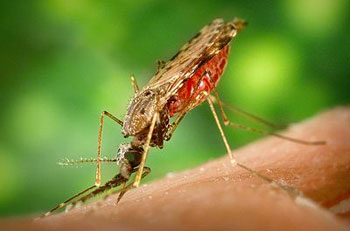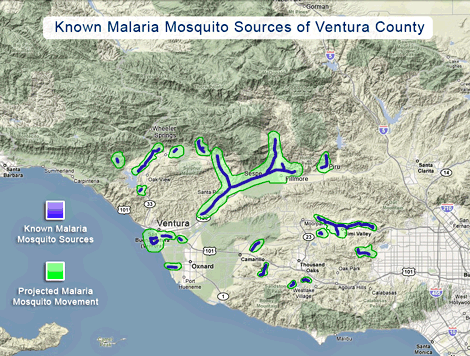Malaria
Malaria was eliminated from the United States in the early 1950s, although 1,500-2,000 travel realted cases are reported each year. The World Health Organization estimates that in 2015, worldwide malaria caused 438,000 deaths. The disease is caused by protozoan parasites of the genus Plasmodium. Five species of the plasmodium parasite can infect humans; the most serious forms of the disease are caused by Plasmodium falciparum. Malaria caused by Plasmodium vivax, Plasmodium ovale and Plasmodium malariae causes milder disease in humans that is not generally fatal. A fifth species, Plasmodium knowlesi, causes malaria in macaques but can also infect humans. This group of human-pathogenic Plasmodium species is usually referred to as malaria parasites.
Usually, people get malaria by being bitten by an infective female Anopheles mosquito. Only Anopheles mosquitoes can transmit malaria, and they must have been infected through a previous blood meal taken on an infected person. When a mosquito bites an infected person, a small amount of blood is taken, which contains microscopic malaria parasites. About one week later, when the mosquito takes its next blood meal, these parasites mix with the mosquito’s saliva and are injected into the person being bitten.
The parasites multiply within red blood cells, causing symptoms of anemia (light-headedness, shortness of breath, tachycardia, etc.), as well as other general symptoms such as fever, chills, nausea, flu-like illness, and, in severe cases, coma, and death.
Malaria transmission can be reduced by preventing mosquito bites with mosquito nets and insect repellents, or by mosquito control measures such as spraying insecticides and draining standing water where mosquitoes lay their eggs. Work has been done on malaria vaccines with limited success and more exotic controls, such as genetic manipulation of mosquitoes to make them resistant to the parasite have also been considered.
Although some are under development, no vaccine is currently available for malaria that provides a high level of protection; preventive drugs must be taken continuously to reduce the risk of infection.
These prophylactic drug treatments are often too expensive for most people living in endemic areas. Most adults from endemic areas have a degree of long-term infection, which tends to recur, and also possess partial immunity (resistance); the resistance reduces with time, and such adults may become susceptible to severe malaria if they have spent a significant amount of time in non-endemic areas.
They are strongly recommended to take full precautions if they return to an endemic area. Malaria infections are treated through the use of antimalarial drugs, such as quinine or artemisinin derivatives. However, parasites have evolved to be resistant to many of these drugs. Therefore, in some areas of the world, only a few drugs remain as effective treatments for malaria.
Between 1957 and 2015, in the United States, 63 outbreaks of locally transmitted mosquito-borne malaria have occurred; in such outbreaks, local mosquitoes become infected by biting persons carrying malaria parasites (acquired in endemic areas) and then transmit malaria to local residents.



